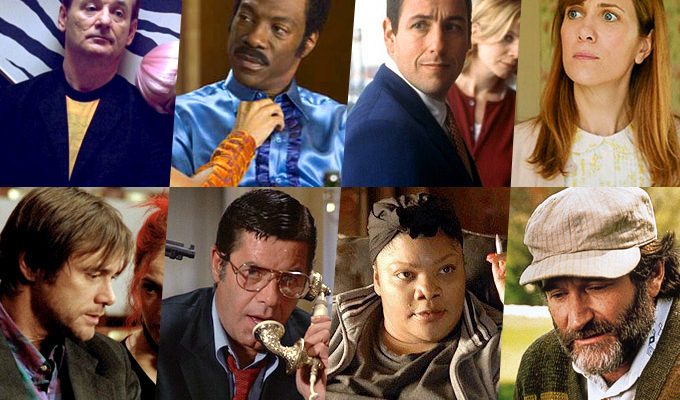 This week sees the release of Bennett Miller‘s absolutely excellent “Foxcatcher” (read our rave review), and with it one of the most chilling cinematic characters in a long while: John DuPont, the entitled, deluded millionaire heir whose desire to make a mark and be loved by those around him ends up with tragic consequences. It’s a remarkable creation, one that’s all the more remarkable for coming from a nearly unrecognizable Steve Carell, an actor best known for his comedic performances on “The Daily Show,” “The Office,” “Anchorman” and “The 40 Year Old Virgin,” among others.
This week sees the release of Bennett Miller‘s absolutely excellent “Foxcatcher” (read our rave review), and with it one of the most chilling cinematic characters in a long while: John DuPont, the entitled, deluded millionaire heir whose desire to make a mark and be loved by those around him ends up with tragic consequences. It’s a remarkable creation, one that’s all the more remarkable for coming from a nearly unrecognizable Steve Carell, an actor best known for his comedic performances on “The Daily Show,” “The Office,” “Anchorman” and “The 40 Year Old Virgin,” among others.
Carell’s embarked into more serious territory before, most notably as the suicidal uncle in “Little Miss Sunshine” and in the apocalyptic romance “Seeking A Friend For The End Of The World,” but his “Foxcatcher” performance is something else entirely, one that looks likely to land him an Oscar nomination and change the way his career is perceived moving forward. But Carell’s hardly the first comedian to pull off this kind of reinvention.
Actors often say that comedy is harder than drama, so it makes sense that stars best known for making audiences laugh can be cast against type to wildly successful effect. So to mark the opening of “Foxcatcher,” we’ve picked out twenty performances when great comic stars dropped the gags and took on serious roles (beyond comedy-dramas, for the most part). Take a look below, and let us know your favorites in the comments.

Bill Murray
Best-Known Comedic Roles: Take your pick —“Caddyshack,” ”Ghostbusters,” “Groundhog Day,” “Rushmore,” etc, etc
Best “Serious” Dramatic Turn: “Lost In Translation” (2003)
Similar to others on this list only maybe more so, Murray’s style of performance is all about finding drama and tragedy in comedy and vice versa. But the first and possibly still the best film to leverage that hangdog world-weariness and to mine it far more for pathos than laughs was Sofia Coppola’s “Lost in Translation” a beautifully bittersweet little film about the fragility of human connection, tinged with a tiny uplift of hope at how that connection can occur between the unlikeliest of people. Murray’s tired, washed-up movie star, shilling for Japanese whisky, finds common ground with Scarlett Johansson’s newly disillusioned young wife, the sense of abandonment both feel heightened by the neon foreignness of Tokyo and drawing them closer together. It was career-redefining work for both of them at that point, and Murray’s sardonic underplaying has arguably never been put to more effective use as a means not to make us laugh, but to quietly break our hearts. He won a swathe of awards for the role but was denied an Oscar, which went to Sean Penn for “Mystic River,” a fact we can only account for by saying that Murray is so good here it really doesn’t feel like acting at all.
Other Dramatic Roles of Note: It’s lightweight, but playing FDR in Roger Michell’s “Hyde Park On Hudson” probably counts, as does his work with Jim Jarmusch, notably “Broken Flowers,” and in the terrible “Passion Play,” but in recent years Murray has tended to occupy a firmly tragicomic register that kind of defies categorization as anything but “Bill Murray.”

Adam Sandler
Best-Known Comedic Roles:“Billy Madison,” “Happy Gilmore,” “The Wedding Singer,” “The Waterboy,” “Grown Ups”
Best “Serious” Dramatic Turn: “Punch Drunk Love” (2002)
So one man’s comedy is another man’s serious drama. If prior to “Inherent Vice,” “Punch Drunk Love” was the closest Paul Thomas Anderson ever got to a chucklefest, then judged within the filmography of its star, the film represented something of a “Schindler’s List.” But what’s maybe so clever about this casting (and to see where we think it fits in PTA’s canon, here’s our retrospective) is that while it was a marked left turn from Sandler, in many ways the role of Barry Egan, a lonely guy with anger management issues who falls hard for Emily Watson’s Lena can easily be read as simply a deeper, more truthful, more idiosyncratic version of the kind of manchild roles that Sandler has made his area of expertise elsewhere (like, erm, “Anger Management”). But the degree to which Sandler stepped up to the plate here is surprising, delivering what is still to us the best and certainly most nuanced performance he’s ever given.
Other Dramatic Roles of Note: To lesser effect, Sandler’s “gone serious” a few other times, with “Spanglish,” “Reign Over Me” and “Funny People,” as well as taking a role in Jason Reitman’s widely derided “Men Women and Children” this year.

